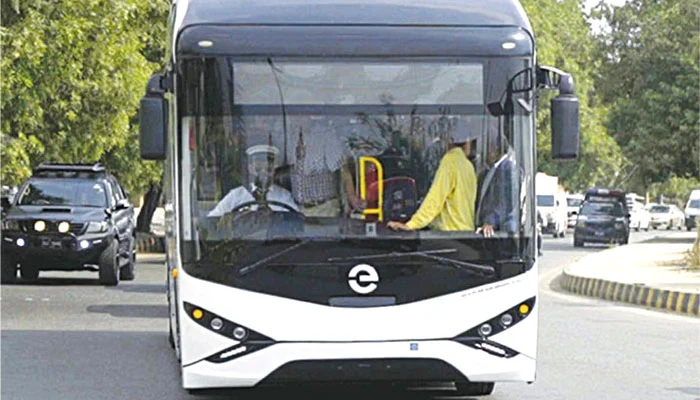Pakistan Karachi: The Sindh government has approved a plan to add 500 fully electric buses to Karachi’s transportation network and instructed the appropriate departments to complete the necessary paperwork, marking a significant improvement to the city’s deteriorating public transportation system.
According to an official statement released by the CM House on Saturday, the decision was made by Sindh Chief Minister Murad Ali Shah, who presided over a joint meeting of various departments to review the progress of the various projects that would be launched with the assistance of donor agencies.
Sharjeel Memon, Nasir Shah, Jam Ikram, Karachi Mayor Murtaza Wahab, Chief Secretary Asif Hyder Shah, and other concerned officials attended the meeting at CM House.
During the meeting, the CM noted that the Sindh capital’s overcrowded, inefficient, and harmful to the environment public transportation system was overwhelmed by its expanding population and aging fleet.
He went on to say that the introduction of electric, pink, and Peoples Bus Service buses has changed things, but even then, a large fleet of buses was needed to solve the city’s problem with public transportation.
Memon informed the chief minister that his department has proposed to him the introduction of 500 fully electric buses into the city’s transportation network to address these issues and promote sustainable urban mobility.
He went on to say that the change would make commuters’ lives better, lessen traffic jams, and significantly reduce air pollution.
According to CM Murad, the transportation department has begun discussing the proposal with donor agencies and hopes to secure funds. Additionally, he directed the transportation and planning and development (P&D) departments to complete the necessary paperwork.
In addition, the chief minister emphasized that Sindh’s transportation system outside of Karachi required urgent modernization and expansion to meet the population’s growing demands.
He stated, “The current public transportation offerings struggle to keep pace as the province continues to develop economically and socially.”
A transport from People groups Transport Administration stands stopped at its terminal in Karachi. — X/pbsbrtsindh A Peoples’ Bus Service bus is parked at its Karachi terminal. X/pbsbrtsindh The provincial transport minister stated that his department was working on a proposal to acquire 300 diesel-hybrid buses, with 60 buses going to each of Sindh’s five divisions, to improve connectivity, raise environmental standards, and guarantee a dependable and effective mode of transportation for all residents.
He stated that each Division—Hyderabad, Sukkur, Larkana, Mirpurkhas, and Shaheed Benazirabad—would receive 60 buses.
The meeting also talked about getting 300 electric buses for intercity transportation in the province.
Memon informed CM Murad that the project would assist in connecting provincial divisional headquarters.
The initiative, according to the chief executive of Sindh, should offer a public transportation option that is less expensive, safer, and better for the environment than the private operators’ fare hikes and address safety concerns.
According to Memon, the plan would provide 60 EVM buses to Karachi, 50 to Sukkur, Hyderabad, Larkana, and Shaheed Benazirabad, and 40 to Mirpurkhas.
Memon stated that the private operator would be offered financing, acquiring, supplying, operating buses, maintaining various systems, and providing related services for the Yellow Line Bus Rapid Transport (BRT).
The corridor’s design was described as a third-generation BRT, according to CM Murad. From Dawood Chowrangi to Numaish, a 21-kilometer dedicated corridor serves as the primary BRT trunk corridor. In addition, the transportation minister mentioned that the battery-electric buses technology option was being considered.
The transportation and Public-Private Partnership (PPP) unit was instructed by the CM to finish the feasibility study by the end of November 2024.



